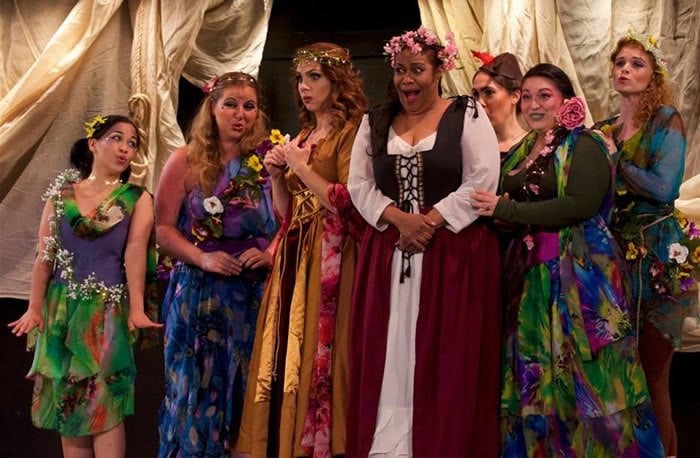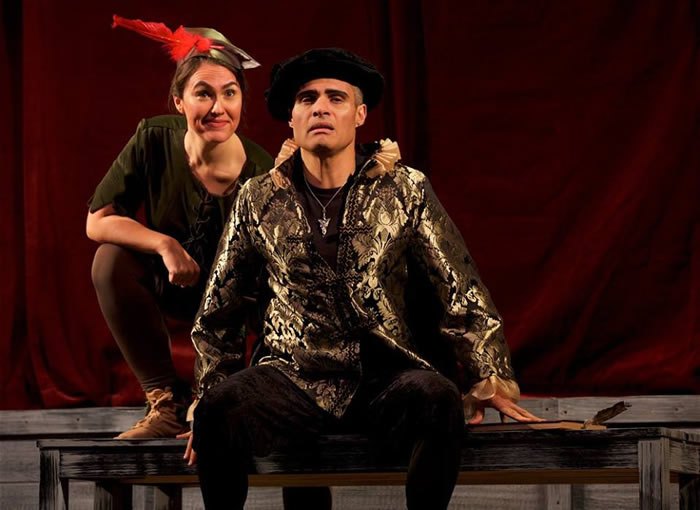“I’m stuck with writer’s block!”
Who among us—be we beginners, practitioners or professionals, list makers, blog posters, PhD thesis or diary writers—has not been visited by that alarming thought?
True that may be; and yet: who among us has been able to pose it to Puck?
In The In Series’s enchanting staging of Carl Maria von Weber’s final work, the 1826 opera Oberon, or The Elf King’s Oath, adroitly taken in hand by Adapter and Director Nick Olcott, the eponymous Elf King makes that very admission. And is taken—and takes us—on a whirlwind tour, where young love is at turns idealized, traumatized and demystified, its joys and doubts, fears and sorrows set to the music of a young German composer whose final work it would be. An Early Romantic who had imbibed the operatic legacy of Mozart (who was also his brother-in-law), Weber incorporated wink-wink musical allusions to the latter’s last in his own, adding an extra layer of pleasure for his listeners—one which is further explored and enjoyably exploited by Olcott, who inserts references to popular culture that are fully in tune with the spirit of the work

As Oberon, Aurelio Dominguez displays a boyish enthusiasm soon tempered and mellowed by the
consequences of the rash vow he had made to his Queen, who was displeased that in his previous tale, “A Midsummer Night’s Dream,” he cheated: the story’s successful resolution depended on magic. Promising to write one where the power of love alone overcomes whatever obstacles he places in its path, he summons Puck (Katherine Fili), who helps him come up with an improbable plot with even more recondite character names, but in which the lovers will find happiness in the end. Dominguez’s lyric tenor voice and dramatic skills are an excellent fit for the role.
Fili’s Puck is an androgynous delight, a sort of Peter Pan of the Fairyland (there are even pirates) whose childlike insouciance and spirited application of a limber frame and real-world wisdom make him the perfect partner for the impractical Oberon, whom he humors with sober mien while nudging him imperceptibly, if not always successfully, in a more rational direction (“Don’t go all Tempest on me” he says pointedly when Puck suggests a shipwreck) while occasionally even surpassing him in wackadoodle. Fili’s easy command of the vocal as well as physical and dramatic demands of the mezzo-soprano role make her Puck an irresistible character.
As the opera (and the eponymous German poem by Christoph Martin Wieland on which it is based) presents a tale-within-a-tale, so the set (Jonathan Dahm Robertson) forms two levels: an elevated gray-slatted platform with two wooden benches (which will rarely be used merely as seats) fronting a red-velvet-curtained proscenium stage further elevated behind it—in a sense, upending the usual function of the so-called “frame story” by physically “framing” the main story.
That latter is something out of a fever dream whose hilariously counter-intuitive, everything-in-the-pot plot twists are as a finger in the eye to the fairy-tale canon, yet at the same time, poke affectionate fun at it—and even honor it.
As Rezia, the imperiled Princess of Cadilith, Cara Gonzalez is believable, sympathetic and moving, her supple lyric soprano confident in the demanding tessitura, from impeccable coloratura runs and trills to thrilling dramatic fire to rich, deep chest voice, employing them as springboards to explore the emotional complexity of the character. The role of her intended, Sir Huon, Knight of Clethrany, offered tenor Sammy Huh some delectable top notes which he caressed with a lambent purity, imbuing his heartfelt, desperate plea over Rezia’s motionless body with a noble passion in the phrase: “Spare, o spare this tender flower.”
The Papageno and Papagena to Tamino and Pamina’s Huon and Rezia are Alex Alburqueque as Sherasmin, Huon’s squire, and Anamer Castrello as Floria, Rezia’s maid, reluctant lovers who begin by warning each other, with decreasing conviction, about everything that would make them a bad catch. Their voices blend in an infectiously melodious vocal gigue (“Let us be merry, let us be gay”), and we know—as Castrello’s “horsewoman” vigorously “rides” Alburqueque’s pawing “steed”—that they have met their soul mates.
Castrello and Alburqueque also display their respective chops elsewhere: Castrello, in a duet with Gonzalez’s Rezia, “Ah, happy maid!” where the voices and vocal colors blend harmoniously, overlain with a burnished, dulcet sheen; and Alburqueque, in a scene where his kinetic and comedic talents flourish, Sherasmin listening with keen attentiveness, lying on his stomach, propped up with his elbows, legs spread and swaying wildly like a hormonal teen’s as Oberon describes his battle plan.
The Elves and Fairies (Emily Casey, Teresa Ferrara, Patricia Portillo, CJ David, Nick Carratura, Simon Charette, Elliot Matheny) are graceful, playful and vivacious. The Elves are clad in brightly variegated, summery togs, each accented with a shoulder-to-hip wraparound string of sparkling silvery lights, and the Fairies in glittery gowns of luscious blues, greens and fuchsias and soft, wavy, floor-length hair to match. In one scene, when Puck calls upon the Fairies to carry out Oberon’s ordinance, they respond from the theater’s wraparound balcony high above the audience, communicating rapidly in a call-and-response choral cadence of complex nonsense words articulated meticulously and set to music that give some fine young singers a chance to show their stuff. Two of them also have a lovely duet, “O, ’tis pleasant to float and sing,” that is soothingly melodious, sure-voiced and clear.
Kudos to Costume Designer Donna Breslin, whose vision extends from the glories of the foregoing to the pirates’ vivid red, white and black, accompanied by what look like four-foot (if floppily swishing) swords. Tho they do cause some kerfuffle, in an unconscious (if directorially intentional) stroke for women’s lib, Rezia innocently makes short work of the most menacing one in a slapstick-worthy, Why, who, li’l ol’ me? exhibition of side-splitting soprano bravura. The pirates (Simon Charette is the only one credited in the program) also evoke Mozart’s The Magic Flute—Oberon’s instrument being a magic horn—when they respond to its notes with a goofily grinning, Monastatos-like dance.
Marianne Meadow’s Lighting Design is highly effective, complementing Breslin’s costume design most notably in Act I (Olcott’s adaptation has condensed the original’s three acts into two), when the two couples join on the Fairyland stage, their shades of black and gold, beige, gray and burgundy set off against wide ribbons of eggshell organza looped across a slate-gray wall. Stage Manager Cindy King makes the alignment of this production’s disparate pieces seem as graceful and inevitable as the story’s improbable yet ultimately satisfying dénouement.
Conductor Stanley Thurston leads the skilled sixteen-piece “Instrumental Ensemble” with precision, enthusiasm and attentiveness to nuance, making its reduced size barely noticeable even in the well-known overture that opens the opera.
The song lyrics (as written) are projected on video screens at either side of the theater, serving not only to facilitate comprehension (even when sung in English, an aria’s words can be hard to make out) but to draw our attention to Olcott’s inventive, sometimes slyly updated adaptation of James Robinson Planché’s original libretto. Indeed, Olcott, whose experience directing opera is as broad (French opera in French at Opera Lafayette, Suor Angelica / Gianni Schicchi in Prague) as it is deep (Fidelio, Così fan tutte Goes Hollywood, Trouble in Tahiti), put a number of his many talents and capabilities in service to the realization of this all-too-often-neglected little brother of an opera, which both followed and prefigured themes and concepts that would resonate into the present day, and show no signs of diminishing.
In her introductory remarks prefacing the final performance, Producing / Artistic Director Carla Hübner told us, “It’s been a joyful ride all the way.” While there are no more shows for this Oberon, next year the In Series begins its 2017-2018 season—in a way, resuming the journey—with what would be, as his own was for Weber, Mozart’s final, magical opera: The Magic Flute.

Running Time: Two hours and 45 minutes, with one 20-minute intermission.
Oberon, or The Elf King’s Oath played from June 10–18, 2017, at The In Series performing at GALA Hispanic Theatre – 3333 14th Street, NW, in Washington. DC.




